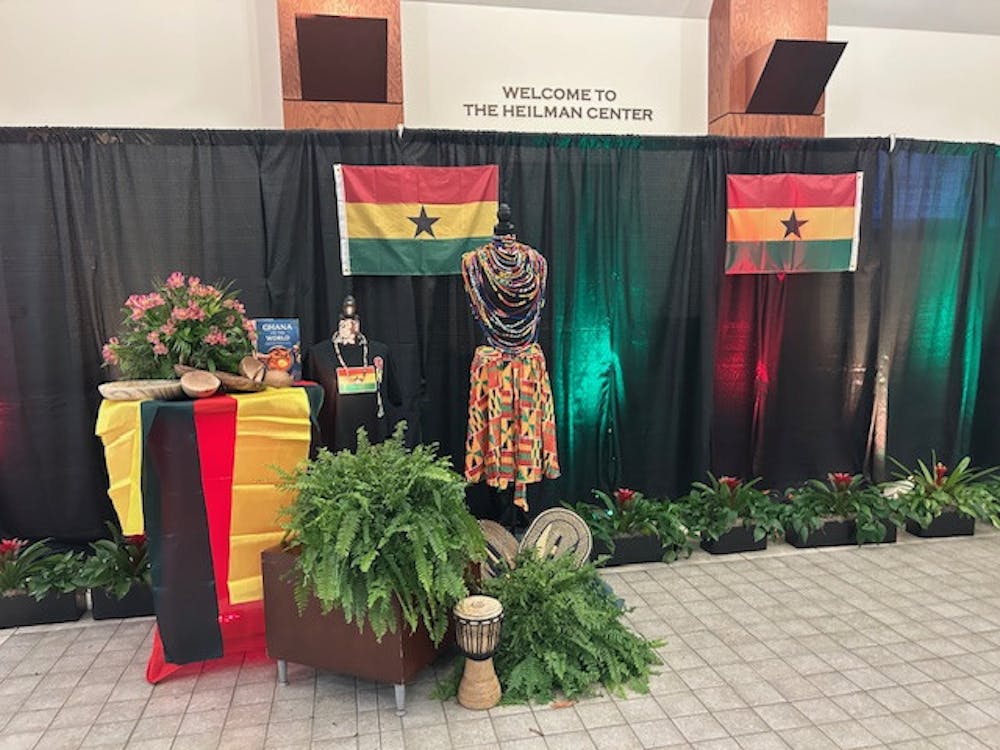The student stepped timidly forward to the microphone after the crowd stood silent for about 30 seconds. He held a letter written from a boyfriend to his girlfriend's rapist.
"Dear Rapist," he read. "You have produced a legacy of pain and grief. You have given her the worst nightmare."
He was one of 18 people who shared stories about sexual assault in front of more than one hundred mostly female students, faculty and staff members at the Forum at the annual Take Back the Night Tuesday evening.
Talking about and coping with the effects of a rape or sexual assault is the most important part of the healing process and critical for preventing future incidents, said Kerry Fankhauser, associate dean of Westhampton College and the event's keynote speaker.
Fankhauser said she had been sexually assaulted when she was 21 years old and didn't tell anyone until three years later, when she hit her emotional rock bottom. Telling her friends was the first step in healing because they simply believed her, she said.
"I don't know that you ever recover, I think you heal," she said.
Fankhauser said understanding the definition of consent played an important role in preventing sexual assault. Consent is not the absence of no, she said.
"There needs to be a yes," she said.
"Don't assume someone else is going to help. Stop the situation and intervene."
When Fankhauser finished speaking, student after student timidly approached the microphone, and more than half began by saying that they hadn't planned on speaking.
Several students said the best reaction after being approached by someone describing an assault was not to judge, but to believe and show support.
"The most important thing is to listen - it really helps the healing process," said a student who had been sexually assaulted during her first three weeks at Richmond and had felt people got sick of listening to her.
Enjoy what you're reading?
Signup for our newsletter
A few students spoke about being sexually assaulted by people they had known very well, such as boyfriends or people they had been dating.
"In your gut, if you feel like something is wrong, it probably is," advised a student who had been raped by someone she said she loved.
One student who said she was raped while "blacked out" pointed out that females who drink have a right to be safe. She said she didn't know whose fault her sexual assault was.
"I wish the people around me had been more responsible," she said. "I'm not going to judge him - he might have been a good person."
Several students said that they struggled with trust, feelings of shame and embarrassment, depression and other physical and emotional effects.
Participants began the event by taking a silent candlelit walk around the lake with the purpose of remembering and honoring the survivors of sexual assault, said Renee Wilson, president of Student Voices Against Violence. The group organized and sponsored the event, along with Active Minds, the Women Involved in Learning and Living program and the Richmond and Westhampton College deans' offices.
"We wanted it to be dark enough so that it would work; so that people would wonder, 'Hey, what are these people doing?'" Wilson said.
In addition, the darkness might have made it easier for people to share their stories, said Fankhauser, the faculty adviser to Student Voices Against Violence.
"By helping them to speak in public, it can end the silence that victims face because of their individual situation," Wilson said.
A vast majority of sexual assault victims don't seek help from members of the dean's office or the police, said Juliette Landphair, dean of Westhampton College.
"The people they turn to are their friends, if they turn to anybody," she said.
"Having friends and peers have a deeper understanding of this issue helps them to respond effectively."
Fankhauser said she hoped the event would help show that sexual assaults happen more frequently than people thought. She said she also hoped more would help prevent it.
"This is the biggest turnout we've had since I've been here," Wilson said. "I couldn't be more proud of the high rate of attendance and the number of people that were brave enough to speak about their experience."
Contact reporter Taylor Engelson at taylor.engelson@richmond.edu
Support independent student media
You can make a tax-deductible donation by clicking the button below, which takes you to our secure PayPal account. The page is set up to receive contributions in whatever amount you designate. We look forward to using the money we raise to further our mission of providing honest and accurate information to students, faculty, staff, alumni and others in the general public.
Donate Now


